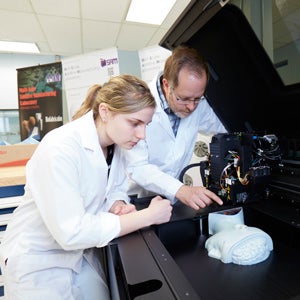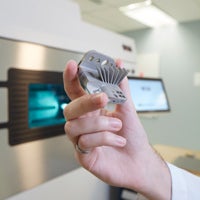The University of Waterloo is building one of the largest university-based facilities in the world to advance additive manufacturing (AM) and help companies adopt AM processes for innovative and customized products.
Backed by nearly $27 million in cash and in-kind support, the lab will enable Canadian companies to tap the enormous potential of AM, commonly known as industrial 3D printing, while also further developing the technology through research.
“Right now, we get a lot of calls from industry about how best to move in this direction,” said Mark Barfoot, managing director of the Multi-Scale Additive Manufacturing Lab at Waterloo. “With this lab, we can leverage our expertise to help companies adopt AM to be globally competitive in the new advanced manufacturing economy.”
In the place of traditional manufacturing processes that cut and shape individual parts out of blocks of material, AM devices gradually build parts up by adding layers of material in a process based on three-dimensional computer designs.
AM will give manufacturers much greater design flexibility while also reducing waste and saving energy. They will also be able to rapidly prototype and quickly repair, instead of replacing, worn or broken parts.
The Waterloo lab is focused on the development of next-generation AM to process metals through the use of new sensors, quality assurance software and machine intelligence. A major patented innovation is the fabrication of “smart components” by 3D printing of sensors and their embedment into metal parts.
Experts at the lab will work directly with companies to develop high-value products using AM processes, equipping them to either do their own production or outsource it.
AM is still relatively expensive and slow compared to current manufacturing methods, particularly for mass production, but its use is expected to increase dramatically as advancements are made. The Waterloo lab aims to achieve this through end-to-end innovation.
“This will change the entire manufacturing enterprise,” said Ehsan Toyserkani, a professor of mechanical and mechatronics engineering who leads the Waterloo research team.
Building on expertise and patented technology developed at Waterloo in the last 17 years, research will involve at least 14 professors and dozens of engineers, post-doctoral fellows, graduate students and co-op students.
When fully equipped, the Waterloo lab will be one of the 10 largest university-based AM facilities in the world. Researchers will also collaborate with peer institutions with top AM labs, including those in Germany, the United States, England and Singapore.
The project got a major boost today with the announcement of $8.9 million in funding through the Federal Economic Development Agency for Southern Ontario. Combined with $6.2 million from the province, that makes it the largest-ever government investment in AM at a Canadian university.
In addition to the governments of Canada and Ontario, numerous industry partners and the University of Waterloo itself also contributed cash and in-kind support to the lab.

